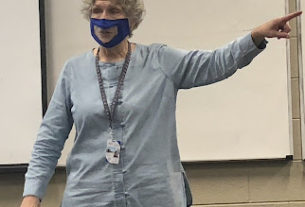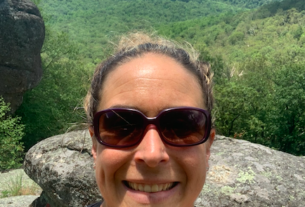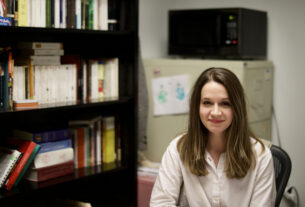
Working for Others, the Life of a Volunteer
Rachel Lemley, staff writer
The fluorescent lights act as an artificial heaven and the bright sky reflects warmly off the bed sheets and shining floor. Everything is a clean, cotton color and carries the faint scent of lemons, but despite the welcoming atmosphere of the hospice, most people admitted here do not end up leaving.
This hospice is one of the places that Emily Han, a UVA student and volunteer, works at, along with the Acute Pediatrics unit at the UVA hospital and Hospice of the Piedmont. She spends most of her time throughout the weeks traveling back and forth from hospitals to school with little time for herself, studying biology, anatomy, and chemistry to better understand the priorities of her job and because of her long-term interest in the subjects. However, the struggle of balancing her time does not compare to the challenges she faces on a daily basis as a hospital volunteer. Han speaks of witnessing the last moments of a terminally-ill, elderly woman.
“I didn’t think it would affect me since I didn’t know her that well. I went into her room, and I just held her hand. And her breathing just slowed down and got slower and slower and just stopped. That was the first time I directly dealt with death. It really didn’t hit me until a few minutes afterward and I started crying a lot. But also I’m glad that I was there because at least she was at peace and wasn’t alone and she had someone with her in her final moments.” She says, recalling her first experience with death.
Han’s insight into the Pediatrics unit gives her the ability to see many children and patients get better throughout their time. She is able to hold and provide care to lonely or sick children during their treatment and up until they are released to live normal lives. Unfortunately, working in the hospice proves much more challenging.
“Hospice patients are people who are already diagnosed with a terminal illness, and they know it. They’ve decided or are not able to undergo any more treatments and are just prepared to let life take its natural course. With hospice, it is hard because you know all of the patient’s are moving toward death. My role is to just sit down and talk with them and comfort them. Sometimes I sit with a patient and we don’t say anything, but I hold their hand.” said Han.
Despite the emotional trauma and hardships she faces, this job offers fulfillment in the knowledge that she made a child happy or gave peace to a person in their last moments. She has had many encounters with heartbreak and death, but understands that good can come out of the effect she has on people.
“I’m very aware of what I can and cannot do,” Han says. “There’s one girl who has been in the hospital since she was born, and since I started volunteering there because something was wrong with her respiratory tract. I’ve been watching her grow up. Sometimes I get to help the occupational therapist, and I just remember the first time she had a weird grip and could only use one hand. A month ago, the therapist was there again and she could hold things normally now and pass things from one hand to the other. Just being able to see the patients get better makes me happy for them.”
These jobs have allowed her to have first-hand experiences into the personal and medical lives of others. They have made her mature into a person skilled in hospital and patient care, however sometimes the most important kind of care to give is one’s sympathy. Many times a patient just needs someone to talk to or take their mind off of the stress.
Han sacrifices not only her time, but her peace of mind for the wellbeing of other people. She wants to eventually have a full-time job in the medical field because of her desire to learn and help others.







